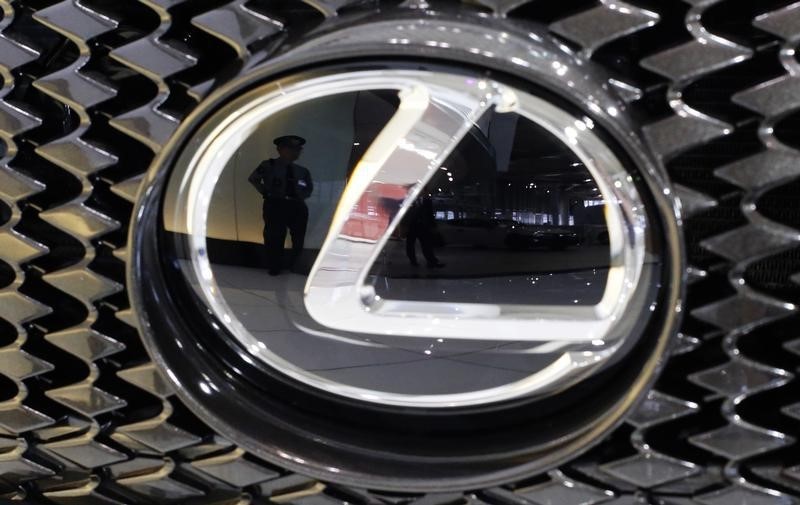By Norihiko Shirouzu
BEIJING (Reuters) - Toyota Motor Corp (T:7203) will likely delay building its premium Lexus brand in China for at least a few years, as growth in China's auto market slows to a crawl and a weak yen makes it cheaper to keep making cars in Japan.
Toyota wants to focus on strengthening the Lexus brand in China and increasing sales in the country to well above 100,000 vehicles a year before investing what could be hundreds of millions of dollars if it was to build a new assembly line, two company executives told Reuters.
The Japanese firm is also reluctant to share control of the Lexus business with a domestic joint venture partner - a requirement for foreign car makers building and selling vehicles in China.
"Toyota's committed to China, and we will eventually start producing Lexus cars here. There's no doubt," one of the executives told Reuters.
"But we need to do a few things before we take the plunge," he said, stressing the importance of making Lexus a "more well-recognized name" in China before committing to production there.
Momentum had been building among key Toyota leaders at the start of 2015 for a decision as early as this year to start Lexus production in China, according to one of the two Beijing-based executives with direct knowledge of the situation.
Discussions had focused on building the Lexus ES sedan or the RX crossover sport-utility vehicle (SUV) in China, said the executive, who spoke on condition of anonymity.
But with China's auto market slowing down significantly – to a growth pace of just 1.4 percent in the first half of this year - it was now unlikely Toyota would take the plunge for at least another few years, probably until 2018 or later, he said.
The delay comes even as rivals such as Nissan's Infiniti (T:7201), Jaguar Land Rover and General Motors' Cadillac (N:GM) have decided to go ahead with plans to begin production in China.
Toyota's decision also has been spurred by the yen's persistent weakness, which makes maintaining production in Japan much more competitive, according to the second Toyota executive.
LUXURY MODELS
Both company executives said Toyota wanted to expand the reach of the Lexus brand beyond just a few, more affordable
"entry-level" luxury models and start selling more higher-end cars like its LS sedan before it begins making cars in China.
According to research firm LMC Automotive, the mid-size ES sedan, the compact NX crossover and the RX crossover SUV account for some 85 percent of Lexus's sales in China, which are forecast to total 83,700 this year, up 12 percent from last year.
"When Mercedes-Benz could sell some 3,000 S-Class flagship sedans a month in China, we sell five or so LS saloons a month," said the first source. "Even in a dead market like Japan, we sell a lot more."
Takanori Yokoi, a Beijing-based Toyota spokesman, said the company was "always trying to find ways to optimize its business, including Lexus in China, including a look at the pros and cons of producing Lexus cars locally in China".
Another factor in Toyota's cautious approach in China was the weakness of the yen, which has fallen around 50 percent against the dollar since the beginning of 2013, making Japan an increasingly competitive place for manufacturing.
That was not a primary reason for postponing Lexus production in China, said the first executive, since exchange rates could not be factored into this type of longer-term capital investment decision.
"Still, with the dollar trading above 120 yen per dollar, there's no doubt our profitability would take a big hit if we shifted production to China," the second executive said.
Rising costs have been making China less competitive as a manufacturing base.
According to Boston Consulting Group, recent moves by U.S. retailer Wal-Mart (N:WMT) and sportswear maker Nike Inc (N:NKE) to shift production of some goods back to the United States were a response to Chinese labor costs that have hit 61 percent of U.S. levels, compared with 17 percent 15 years ago.
Lexus has been a top luxury car brand in the United States for years, selling 311,389 vehicles last year, an annual increase of 13.7 percent.
But in China, a market it entered in 2005, Lexus still remains a second-tier premium brand, far behind dominant German brands such as Audi and BMW.
Starting production of Lexus cars in China would also entail allowing one of Toyota's existing Chinese partners to tap into half of the profits Lexus generates there, among other benefits.

"Our Chinese partner would try to have a say in every aspect of the Lexus business in China," said the first executive. "That would strip us of all the freedom we enjoy today in running the Lexus business."